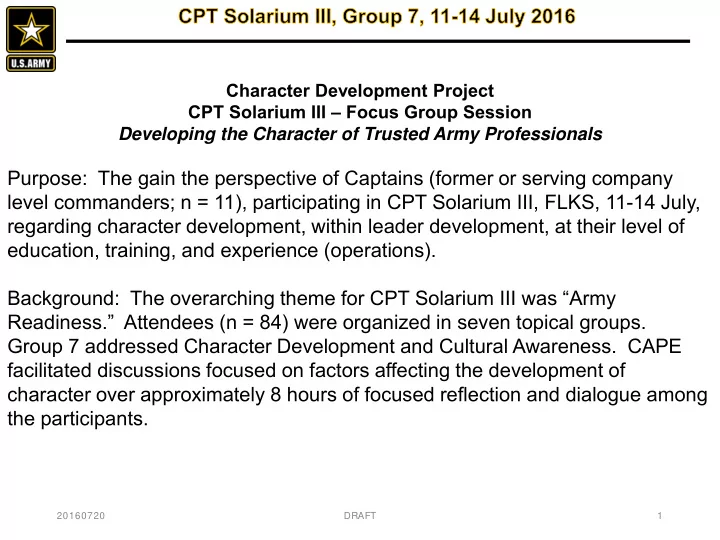

Character Development Project CPT Solarium III – Focus Group Session Developing the Character of Trusted Army Professionals Purpose: The gain the perspective of Captains (former or serving company level commanders; n = 11), participating in CPT Solarium III, FLKS, 11-14 July, regarding character development, within leader development, at their level of education, training, and experience (operations). Background: The overarching theme for CPT Solarium III was “Army Readiness.” Attendees (n = 84) were organized in seven topical groups. Group 7 addressed Character Development and Cultural Awareness. CAPE facilitated discussions focused on factors affecting the development of character over approximately 8 hours of focused reflection and dialogue among the participants. 20160720 DRAFT 1
Character Development Project CPT Solarium III – Focus Group Session Developing the Character of Trusted Army Professionals Findings (1 of 2), Army Captains: • Affirm the imperative of character as essential to mutual trust and cohesive teamwork within Army units and organizations. • Agree that mutual trust, cohesion, and character require an ethical command climate – the absence of an ethical climate compromises trust, undermines teamwork, and encourages misconduct and unethical practices. • Believe that living by and upholding the Army Ethic is a necessary and realistic ideal, applying both on and off duty. • Examples of ethical challenges they have encountered include: command pressure to influence an official investigation; temptations to falsify equipment inventory records; and misrepresent personnel readiness/deployability status based on mission essential skills. DRAFT 2 20160720
Character Development Project CPT Solarium III – Focus Group Session Developing the Character of Trusted Army Professionals Findings (2 of 2), Army Captains: • Expressed mixed opinions concerning the ethical climate within their organizations. [One third felt the climate was not what it should be, another third affirmed their command climate was ethical and levels of trust and cohesion were high, others were ambivalent saying they experienced both positive and negative indicators.] • Believe that ethical climate must be assessed using multiple indicators, for example: command climate surveys, routine interaction with Soldiers and Families, rates of misconduct and investigations. • Cite ethical challenges to include: command pressure to influence an official investigation; temptations to falsify equipment inventory records; and misrepresentation of personnel readiness/deployability status based on mission essential skills. 20160720 DRAFT 3
Character Development Project CPT Solarium III – Focus Group Session Developing the Character of Trusted Army Professionals Recommendations (1 of 2): • Be prepared to challenge authority if there is pressure to violate regulations or established procedures. Leaders must set the example for right conduct. • Submit accurate reports despite the potential for adverse consequences. While the “system” should not encourage “lying” – individuals must accept responsibility. • Professional Development sessions must be scheduled and protected – requires commitment on the part of the Commander to ensure the training is conducted to standard. Integrate Character Development in all training so that it not perceived as an “add on.” • Recognize those who do what is “right” and address what is “wrong” – challenge Soldiers to use ethical reasoning, treat Soldiers “like adults,” and set the expectations and the example for ethical conduct. Leaders must be taught what an ethical climate “looks like” and how to achieve it. • Assess the ethical climate using all available indicators and address adverse findings, Soldiers must see positive results or they will become cynical. DRAFT 4 20160720
Character Development Project CPT Solarium III – Focus Group Session Developing the Character of Trusted Army Professionals Recommendations (2 of 2): • Character Development efforts should begin with recruiting and be reinforced in IET and at all levels of PME – throughout a career. Evaluate character on the OER/NCOER and continue the “Senior Rater Profile.” • Eliminate Soldiers that are not meeting the ethical standard. All Commanders must understand the process (e.g., AR 635-200, Ch 14). Standardize procedures across the Force. • Ensure Character Development is a priority and an overarching theme that will help address: SHARP, Suicide, Risky Behavior, and other issues that today require separate hours of training. Consider testing Soldiers/units on these types of traiing, those that pass the test can get “credit” for the training and focus on mission essential tasks. • Consider adopting an Honor Code to establish the minimum and inspire all to strive for ethical excellence. 20160720 DRAFT 5
Army Character Development Project Timeline NLT J un 17: Publish Concept for Character Development DEC 16: Solicit senior leader feedback during APF J ul 16: Solicit feedback within CPT Solarium Apr 16: Solicit feedback during J LAPS Dec - J un 16: Conduct Analysis of Theories and Concepts for Character Development and Assessment of Character Dec 15: Publish a White Paper on Character Development Nov 15: Info paper update APLDF 16-1 Nov 15: Establish Project Team/ Initial WG meeting Nov 15: Develop the Project Plan Oct - Nov 15: Literature Review Oct 15: M ission Analysis 20160720 6
Recommend
More recommend